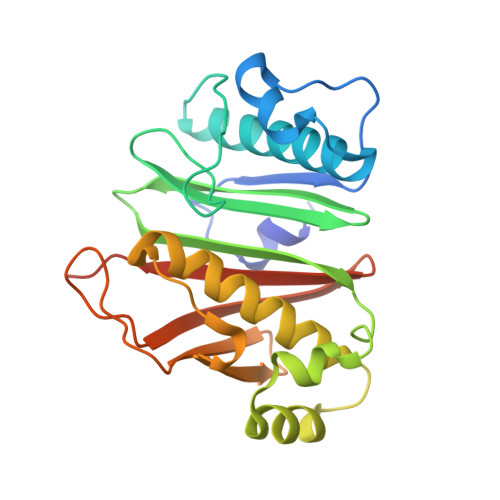Conformational flexibility of coenzyme A and its impact on the post-translational modification of acyl carrier proteins by 4'-phosphopantetheinyl transferases.
Nguyen, M.C., Saurel, O., Carivenc, C., Gavalda, S., Saitta, S., Tran, M.P., Milon, A., Chalut, C., Guilhot, C., Mourey, L., Pedelacq, J.D.(2020) FEBS J 287: 4729-4746
- PubMed: 32128972
- DOI: https://doi.org/10.1111/febs.15273
- Primary Citation of Related Structures:
6QWU, 6QXQ, 6QXR, 6QYF, 6QYG, 6RCX - PubMed Abstract:
One central question surrounding the biosynthesis of fatty acids and polyketide-derived natural products is how the 4'-phosphopantetheinyl transferase (PPTase) interrogates the essential acyl carrier protein (ACP) domain to fulfill the initial activation step. The triggering factor of this study was the lack of structural information on PPTases at physiological pH, which could bias our comprehension of the mechanism of action of these important enzymes. Structural and functional studies on the family II PPTase PptAb of Mycobacterium abscessus show that pH has a profound effect on the coordination of metal ions and on the conformation of endogenously bound coenzyme A (CoA). The observed conformational flexibility of CoA at physiological pH is accompanied by a disordered 4'-phosphopantetheine (Ppant) moiety. Finally, structural and dynamical information on an isolated mycobacterial ACP domain, in its apo form and in complex with the activator PptAb, suggests an alternate mechanism for the post-translational modification of modular megasynthases.
Organizational Affiliation:
Institut de Pharmacologie et de Biologie Structurale (IPBS), Université de Toulouse, CNRS, UPS, Toulouse, France.


















